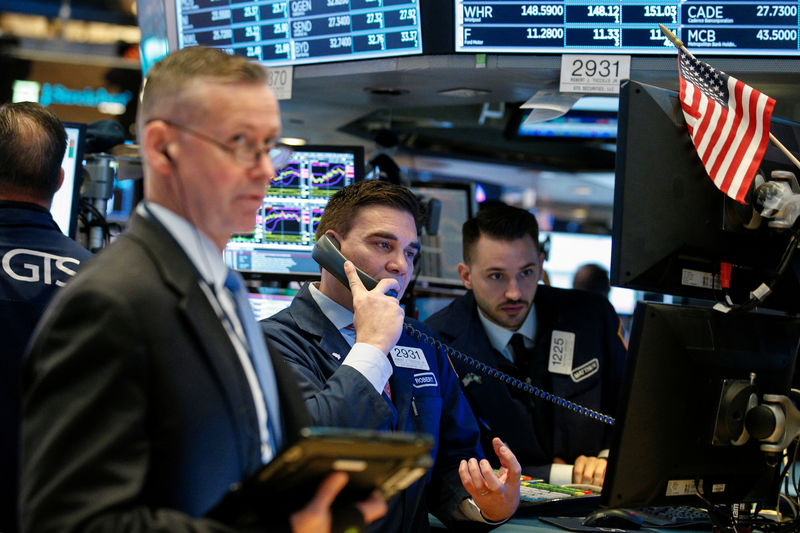LONDON (Reuters) - Following are five big themes likely to dominate thinking of investors and traders in the coming week and the Reuters stories related to them.
PATIENT, PERSISTENT, PRUDENT
ECB chief Mario Draghi has good reason to stick to a mantra of PPP - patience, persistence and prudence - when the central bank meets on Thursday. Since the ECB's March meeting, economic data has disappointed, inflation estimates have been revised lower and a global trade spat may loom.
ECB policymaker Francois Villeroy de Galhau has already said the bank may have to alter its march toward a more normal policy stance if protectionism, exchange rates or market swings end up depressing inflation. Flash Purchasing Managers' Index reports due on Monday will show if the run of soft data -- after a record 18 quarters of uninterrupted growth -- is continuing.
Economists anticipate that ECB steps towards winding down QE will come only in June or later. But Draghi will be pressed on what he thinks about the economic wobbles, trade wars and the euro. In trade-weighted terms, the euro remains less than one percent below a 3-1/2 year high hit on March 8, the last time the ECB met.
(For a graphic on 'The ECB's QE program' click https://reut.rs/2HezxZQ)
FAANGS-TASTIC
The FAANG group of stocks -- Facebook (O:FB), Amazon.com (O:AMZN), Apple Inc (O:AAPL), Netflix (O:NFLX) and Google parent Alphabet Inc (O:GOOGL) -- have tended to move together in the past, but of late their fortunes have diverged: Amazon shares have risen 33 percent this year, Google and Apple have chalked up single-digit gains and Netflix is up a whopping 72 percent.
Facebook shares are at the other extreme, having fallen 6 percent, hit by fears of tighter regulation and slowing advertising revenue growth after a data privacy scandal.
FAANG-topper Netflix has set the results bar high as well, with corporate earnings on track to rise 19.7 percent for the first quarter, their highest increase in seven years.
Now attention turns to the others. Investor interest is running high in Facebook which reports earnings next Wednesday. Google and Amazon will post their results on Monday and Thursday and investors are hoping that earnings growth and forecasts will be strong enough to bring the FAANGs back into favor.
(For a graphic on 'FAANG divorce' click https://reut.rs/2EVJLfJ)
SUCCESSOR-NOMICS
Public support for Japanese Prime Minister Shinzo Abe, the architect of Abenomics -- reforms that have lifted growth and corporate profits while weakening the yen -- has never been this low. Chances are he will not be re-elected leader of the ruling party, yet investors appear unfazed.
The Nikkei volatility index (JNIV) and implied yen volatility
The answer may lie at the central bank, which meets on Thursday and Friday. Its governor Haruhiko Kuroda, the man behind the monetary stimulus, was reappointed this year and would therefore survive beyond an Abe exit. While no policy change is expected, the BOJ's forecasts on inflation will be crucial; sources say it will maintain its view on hitting the target in 2019.
And if Kuroda reassures markets the BOJ is nowhere near an exit from ultra-loose monetary policies, investors will stay unruffled by all the doubts about Abe's political future.
(For a graphic on 'Nikkei and JPY volatility' click https://reut.rs/2J9IcgY)
CRUDE: BARRELS OF FUN
European oil majors Shell (LON:RDSa), Total, Statoil (OL:STL) and Eni, and U.S. oil producers Exxon Mobil (NYSE:XOM) and ConocoPhilips are all due to report next week.
Crude's surge to 2014 highs is a boon to oil companies' bottom line and is supporting share prices but it could also be approaching the point where it starts amplifying inflation.
It is on the radar of U.S. President Donald Trump for sure, inducing him to tweet on Friday that oil prices were being kept "artificially" high by OPEC and this "will not be accepted". While his tweet sent oil prices lower, they remain just below $73 per barrel, a 9 percent gain in 2018.
Will inflation start to become a concern for investors? They are already hyper-sensitive to any sign inflationary pressures are denting consumer confidence in this late-cycle environment. Bond prices have reacted with minor move upwards but it hasn't ruffled too many feathers.
Investors in oil stocks, on the other hand, are in a heightened state of anticipation ahead of the big companies' first-quarter results, which some expect to deliver the strongest cash flow figures in a decade.
(For a graphic on 'A crude awakening - oil and inflation' click https://reut.rs/2K0B5Zn)
IT'S A SNAP!
A snap election in Turkey and U.S. sanctions on Russia are seen influencing central bank policy in both countries next week. Turkey is now seen as very likely to raise interest rates at its meeting on Wednesday, while Russia's Friday meeting may have to hold off cutting rates any further.
With Turkey's election set for June, expectations are the central bank will at last be able to act on tackling double-digit inflation, the assumption being the government won't want to go to the polls with a currency
The lira has firmed more than 3 percent off record lows since the announcement.
In Russia, inflation is well below target but the rouble's 6 percent slump to the dollar in the wake of new U.S. sanctions imposed on April 6 has fuelled concerns of pass through to prices.
Having earlier flagged rate cuts, policymakers are now signaling a "hold", warning of higher inflation expectations. Their take on inflation will be in focus next week as will any comment on the rouble outlook.

(For a graphic on 'Lira and rouble vs. USD' click https://reut.rs/2JZusGG)